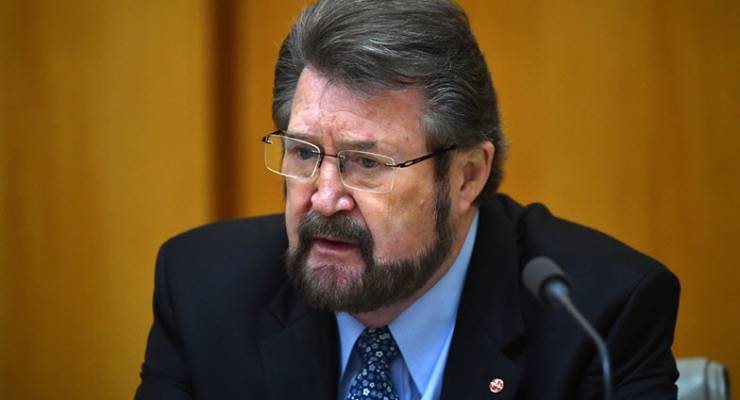
It was a stark Perth image I will never forget. An attractive, white-haired woman, who was much younger than she looked and obviously discomforted, standing and leaning on a crutch in a meeting room at the Four Seasons hotel. Across the room, past a woman in a wheelchair, another middle-aged woman leant against the wall.
Standing, not because there weren’t enough seats among the 50 people crowded into a committee room, but because they were in too much pain to sit.
Welcome to the nightmarish world of thousands of Australian women who over the past decade had polypropylene mesh implanted in their bodies — sometimes without their knowledge. Many times after surgeons had down-played or glossed over the risks of crippling side effects.
And welcome to another public hearing of a Senate committee I fought to establish last year: a Perth hearing of the Senate Community Affairs References Committee into “the number of women in Australia who had had trans-vaginal mesh implants and related matters”.
The woman leaning on the crutch was Stella Channing. I don’t know how old she is but she has a young, impressively attentive daughter named Michaela, who hovered over her mother during the eight-hour public (and sometimes private) recounting of horror stories last week.
I now know that before being fitted with the controversial mesh Stella was a physical fitness instructor. She said that after persevering all day at the hearing she’ll “be in bed for a week”.
I won’t pre-empt the Senate committee here. We have more public hearings in Sydney and Canberra next month.
I will repeat though what I said in the Senate last year, that this is “one of the greatest medical scandals and abuses of mothers in Australia’s history.”
Our Perth visit was only happening because I was approached by Cass Chisholm, a victim and the founder of the Australian Pelvic Mesh Support Group. She emailed me from Perth, complaining that GPs, surgeons and politicians (state and federal) had ignored mesh victims for years.
The life raft group Cass and Stella are involved with started in 2014. At the beginning of 2017 they had 300 members. They now have more than 1,200.
When I agreed to meet her, Cass Chisholm took the red-eye from Perth to Melbourne that night. And a South Australian victim, Kim Blieschke, drove from Port Pirie to Adelaide and then flew on to Melbourne.
(It wasn’t until I met other victims, who perched gingerly on chair’s edge and declined a taxi because they “preferred to stand up in the train”, that I realised the pain of car and plane travel for thousands of afflicted Australian women.)
Some of them retold their graphic and painful stories in Melbourne. And I want to thank all these brave women whose intimate experiences only should have been told behind closed doors to their doctors — if only their doctors had listened and believed them.
***
A federal election is due when? The rhetoric and hyperbole of this week — as we prepare for another bruising Canberra session next week — could have convinced you a poll was merely weeks away.
What language! From the Government frontbenchers came warnings of a Shorten Government producing 1984-style socialist economies. “East German” in style, said Mathias Cormann. Like “Cuba”, said the Manchurian candidate, Josh Frydenberg.
On the other side we had Bill Shorten calling the Prime Minister “weak”. I think the word “coward” even snuck in there somewhere.
It’s all still far short of the Master Paul Keating’s jibes that “a soufflé never rises twice” (Andrew Peacock), “All tip, no iceberg” (Costello), or the Libs as “a dog returns to his vomit.”
Not quite that graphic yet, but a federal election is still two years away.
***
As the Yes or No debate intensifies over marriage equality, at least John Howard has come clean about the reason for the 2004 changes to the Marriage Act — which Labor supported. And which, when in office, Labor did not attempt to change despite having an atheist and progressive PM in Julia Gillard. And which did not go to a plebiscite.
Former Prime Minister Howard admitted recently that the main reason for the explicit man/woman tightening of the Act was because the government did not want couples in same-sex relationships who married overseas to use the courts to set a precedent which could legalise same-sex marriage in Australia.
“What we didn’t want to happen in 2004 was for the courts to start adjudicating on the definition of marriage because that was a real threat in 2004 because some people who had contracted same-sex marriages in another country had the capacity to bring their issues before courts in Australia. There was no definition in the Marriage Act in 2004 for the simple reason it had never occurred to the people before 2004 that marriage was other than between a man and a woman.”
It has occurred to hundreds of millions of people around the world since then.








Listen, you dole-bludger… pointing out that you’re not the only turd floating in the punchbowl, won’t distract ANYONE from the fact that you didn’t get your s44(i) sh*t in f*cking order!
And shove your backhanded “offer” to front the judge if you’re ordered to do it… we KNOW how you feel about fronting the judge when you’re ordered to do it. The Prisons Office knows how you feel about fronting judges when you’re told to do it.
“because that was a real threat in 2004 because some people who had contracted same-sex marriages ”
“Contracted”? What, does he think it’s a disease, like Ebola?
“Well I went overseas as a heterosexual, but while there I contracted homosexuality and a same-sex marriage. Dastardly thing to get rid of, what!”
He does.